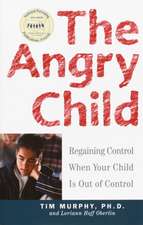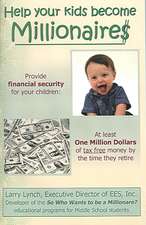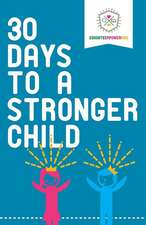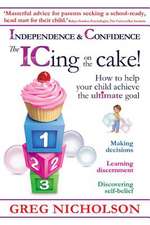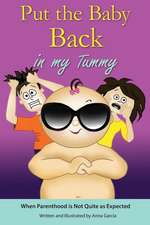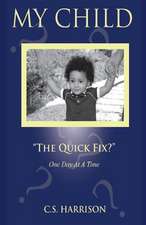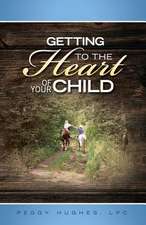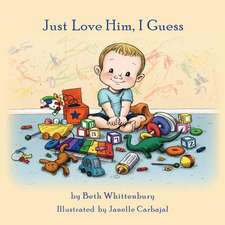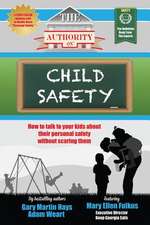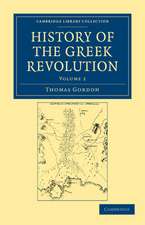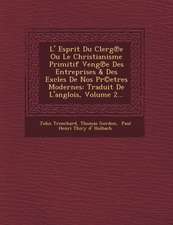Parent Effectiveness Training: The Proven Program for Raising Responsible Children
Autor Thomas Gordonen Limba Engleză Paperback – 30 sep 2000
How to avoid being a permissive parent
How to listen so kids will talk to you and talk so kids will listen to you
How to teach your children to "own" their problems and to solve them
How to use the "No-Lose" method to resolve conflicts
Using the timeless methods of P.E.T. will have immediate results: less fighting, fewer tantrums and lies, no need for punishment. Whether you have a toddler striking out for independence or a teenager who has already started rebelling, you'll find P.E.T. a compassionate, effective way to instill responsibility and create a nurturing family environment in which your child will thrive.
Preț: 93.82 lei
Nou
Puncte Express: 141
Preț estimativ în valută:
17.95€ • 18.68$ • 14.82£
17.95€ • 18.68$ • 14.82£
Carte disponibilă
Livrare economică 24 martie-07 aprilie
Preluare comenzi: 021 569.72.76
Specificații
ISBN-13: 9780609806937
ISBN-10: 0609806939
Pagini: 384
Dimensiuni: 132 x 205 x 21 mm
Greutate: 0.29 kg
Ediția:Rev Pbk.
Editura: HARMONY
ISBN-10: 0609806939
Pagini: 384
Dimensiuni: 132 x 205 x 21 mm
Greutate: 0.29 kg
Ediția:Rev Pbk.
Editura: HARMONY
Notă biografică
DR. THOMAS GORDON, a licensed psychologist, was the recipient of the 1999 American Psychological Foundation's Gold Medal Award for Enduring Contribution to Psychology, the 2000 Lifetime Achievement Award from the California State Psychological Association, and the first recipient of the Career Achievement Award from the National Parenting Instructors Association. He has been a consultant to the White House Conference on Children and the White House Fellows. Dr. Gordon is the author of eight books, including Leader Effectiveness Training (L.E.T.) and Teacher Effectiveness Training (T.E.T.). He works in Solana Beach, California, and has two grown daughters and two grandchildren.
For more information, please visit the Gordon Training International Web site at www.gordontraining.com.
For more information, please visit the Gordon Training International Web site at www.gordontraining.com.
Extras
P.E.T. will be described in terms familiar to everyone, not in technical jargon. Some parents may find themselves initially disagreeing with some of these concepts, but very few will find themselves not understanding them.
Since readers will not be able to express their concerns face-to-face with an instructor, here are some questions and answers that may be helpful at the start.
question: Is this another permissive approach to raising children?
answer: Definitely not. Permissive parents get into as much trouble as overly strict parents, for their kids often turn out to be selfish, unmanageable, uncooperative, and inconsiderate of the needs of their parents.
question: Can one parent use this new approach effectively if the other sticks to the old approach?
answer: Yes and no. If only one parent starts to use this new approach, there will be a definite improvement in the relationship between that parent and the children. But the relationship between the other parent and the children may get worse. Far better then, for both parents to learn the new methods. Furthermore, when both parents try to learn this new approach together, they can help each other a great deal.
question: Will parents lose their influence over the children with this new approach? Will they abdicate the responsibility to give guidance and direction to their childrens' lives?
answer: As parents read the first chapters, they may get this impression. A book can only present a system step by step. The early chapters deal with ways to help children find their own solutions to problems they encounter. In these situations, the role of an effective parent will seem different--much more passive or "nondirective" than parents are accustomed to. Later chapters, however, deal with how to modify unacceptable behavior of children and how to influence them to be considerate of your needs as parents. In these situations, you will be shown specific ways of being an even more responsible parent--acquiring even more influence than you have now. It might be helpful to check the Table of Contents for the subjects covered in later chapters.
This book teaches parents a rather easy-to-learn method of encouraging kids to accept responsibility for finding their own solutions to their own problems, and illustrates how parents can put that method to work right away in the home. Parents who learn this method (called Active Listening) may experience what P.E.T.-trained parents have described:
"It's such a relief not to think I have to have all the answers to my children's problems."
"P.E.T. has made me have a much greater appreciation of the capacities of my children for solving their own problems."
"I was amazed at how the Active Listening method worked. My kids come up with solutions to their problems that are often far better than any I could have given them."
"I guess I've always been very uncomfortable about playing the role of God--feeling that I should be knowing what my kids should do when they have problems."
Today, thousands of adolescents have fired their parents, and for good reason as far as the kids are concerned.
"My mom doesn't understand kids my age."
"I just hate to go home and get lectured to every night."
"I never tell my parents anything; if I did they wouldn't understand."
"I wish my dad would get off my back."
"As soon as I can, I'm going to leave home--I can't stand their constantly hassling me about everything."
The parents of these kids are usually well aware of having lost their jobs, as evidenced by these statements made in our P.E.T. classes:
"I have absolutely no more influence over my sixteen-year-old boy."
"We've given up with Annie."
"Ricky won't ever eat with us, and he hardly ever says a word to us. Now he wants a room out in the garage."
"Mark is never home. And he'll never tell me where he goes or what he's doing. If I ever ask him, he tells me it's none of my business."
To me it is a tragedy that one of the potentially most intimate and satisfying relationships in life so often creates bad blood. Why do so many adolescents come to see their parents as "the enemy"? Why is there such a rift between parents and children? Why are parents and youth in our society literally at war with each other?
Chapter 14 will deal with these questions and show why it is unnecessary for kids to rebel and revolt against their parents. P.E.T. is revolutionary, yes, but not a method that invites revolution. Rather, it is a method that can help parents avoid being fired, can prevent war in the home, and bring parents and children closer rather than grouped against each other as hostile antagonists.
Parents who at first may be inclined to reject our methods as too revolutionary may find the motivation to study them with an open mind by reading the following excerpt from a history submitted by a mother and father after they had taken P.E.T.
"Bill, at sixteen, was our greatest problem. He was estranged. He was running wild and was completely irresponsible. He was getting his first D's and F's in school. He never came home at the agreed times, offering as excuses flat tires, broken watches, and empty gas tanks. We spied on him, he lied to us. We grounded him. We took away his license. We docked his allowance. Our conversations were full of recriminations. All to no avail. After one violent argument, he lay on the kitchen floor and kicked and screamed and shouted that he was going crazy. At that point we enrolled in Dr. Gordon's class for parents. Change did not come overnight . . . We never had felt like a unit, a warm and loving, deeply caring, family. This only came about after great changes in our attitudes and values. . . . This new idea of being a person--a strong, separate per- son, expressing his own values but not forcing them on another, but being a good model--this was the turning point. We had much greater influence. . . . From rebellion and fits of rage, from failure in school, Bill changed to an open, friendly, loving person who calls his parents 'two of my favorite people.' . . . He is finally back in the family. . . . I have a relationship with him I never believed possible, full of love and trust and independence. He is strongly internally motivated and, when each one of us is also, we really live and grow as a family."
Parents who learn to use our new ways of communicating their feelings are not likely to produce a child like the sixteen-year-old boy who sat in my office and announced with a straight face:
"I don't have to do anything around the house. Why should I? It's my parents' job to take care of me. They are legally required to. I didn't ask to be born, did I?"
When I heard what this young man said and obviously believed, I could not help but think, "What kind of persons are we producing if children are permitted to grow up with the attitude that the world owes them so much even though they give back so little? What kind of citizen are parents sending out into the world? What kind of society will these selfish human beings make?"
Almost without exception parents can be categorized roughly into three groups--the "winners," the "losers," and the "oscillators." Parents in the first group strongly defend and persuasively justify their right to exercise authority or power over the child. They believe in restricting, setting limits, demanding certain behaviors, giving commands, and expecting obedience. They use threats of punishment to influence the child to obey, and mete out punishments when he does not. When conflict arises between the needs of the parents and those of the child, these parents consistently resolve the conflict in such a way that the parent wins and the child loses. Generally, these parents rationalize their "winning" by such stereotyped thinking as "This is the way my parents raised me and I turned out pretty well," "It's for the good of the child," "Children actually want parental authority," or simply the vague notion that "It is the responsibility of parents to use their authority for the good of the child, because parents know best what is right and wrong."
The second group of parents, somewhat fewer in number than the "winners," allow their children a great deal of freedom most of the time. They consciously avoid setting limits and proudly admit that they do not condone authoritarian methods. When conflict occurs between the needs of the parent and those of the child, rather consistently it is the child who wins and the parent who loses, because such parents believe it is harmful to frustrate the child's needs.
Probably the largest group of parents is made up of those who find it impossible to follow consistently either one of the first two approaches. Consequently, in trying to arrive at a "judicious mixture" of each they oscillate back and forth between being strict and lenient, tough and easy, restrictive and permissive, winning and losing. As one mother told us:
"I try to be permissive with my children until they get so bad I can't stand them. Then I feel I have to change and start using my authority until I get so strict I can't stand myself."
The parents who shared these feelings in one of the P.E.T. classes unknowingly spoke for the large number in the "oscillating group." These are the parents who are probably most confused and uncertain, and, as we shall show later, whose children are often the most disturbed.
The major dilemma of today's parents is that they perceive only two approaches to handling conflicts in the home-- conflicts that inevitably arise between parent and child. They see but two alternatives in child-rearing. Some choose the "I win--you lose" approach, some the "You win--I lose" approach, while others seemingly cannot decide between the two.
Parents in P.E.T. are surprised to learn that there is an alternative to the two "win-lose" methods. We call it the "no-lose" method of resolving conflicts, and helping parents learn how to use it effectively is one of the principal aims of P.E.T. While this method has been used for years for resolving other conflicts, few parents have ever thought of it as a method for resolving parent-child conflicts.
Many husbands and wives resolve their conflicts by mutual problem-solving. So do business partners. Labor unions and management negotiate contracts binding to both. Property settlements in divorces are often arrived at by joint decision-making. Even children frequently work out their conflicts by mutual agreement or informal contracts acceptable to both ("If you do this, then I'll agree to that"). With increasing frequency, corporations are training executives to use participative decision-making in resolving conflicts.
No gimmick or quick road to effective parenthood, the "no-lose" method requires a rather basic change in the attitudes of most parents toward their children. It takes time to use it in the home, and it requires that parents first learn the skills of nonevaluative listening and honest communication of their own feelings. Consequently, the no-lose method is described and illustrated in later chapters of this book.
Its position in the book, however, does not reflect the true importance of the no-lose method in our total approach to child-rearing. In fact, this new method of bringing discipline into the home through effective management of conflict is the heart and soul of our philosophy. It is the master key to parent effectiveness. Parents who take the time to understand it and then conscientiously employ it at home as the alternative to the two win-lose methods are richly rewarded, usually far beyond their hopes and expectations.
Since readers will not be able to express their concerns face-to-face with an instructor, here are some questions and answers that may be helpful at the start.
question: Is this another permissive approach to raising children?
answer: Definitely not. Permissive parents get into as much trouble as overly strict parents, for their kids often turn out to be selfish, unmanageable, uncooperative, and inconsiderate of the needs of their parents.
question: Can one parent use this new approach effectively if the other sticks to the old approach?
answer: Yes and no. If only one parent starts to use this new approach, there will be a definite improvement in the relationship between that parent and the children. But the relationship between the other parent and the children may get worse. Far better then, for both parents to learn the new methods. Furthermore, when both parents try to learn this new approach together, they can help each other a great deal.
question: Will parents lose their influence over the children with this new approach? Will they abdicate the responsibility to give guidance and direction to their childrens' lives?
answer: As parents read the first chapters, they may get this impression. A book can only present a system step by step. The early chapters deal with ways to help children find their own solutions to problems they encounter. In these situations, the role of an effective parent will seem different--much more passive or "nondirective" than parents are accustomed to. Later chapters, however, deal with how to modify unacceptable behavior of children and how to influence them to be considerate of your needs as parents. In these situations, you will be shown specific ways of being an even more responsible parent--acquiring even more influence than you have now. It might be helpful to check the Table of Contents for the subjects covered in later chapters.
This book teaches parents a rather easy-to-learn method of encouraging kids to accept responsibility for finding their own solutions to their own problems, and illustrates how parents can put that method to work right away in the home. Parents who learn this method (called Active Listening) may experience what P.E.T.-trained parents have described:
"It's such a relief not to think I have to have all the answers to my children's problems."
"P.E.T. has made me have a much greater appreciation of the capacities of my children for solving their own problems."
"I was amazed at how the Active Listening method worked. My kids come up with solutions to their problems that are often far better than any I could have given them."
"I guess I've always been very uncomfortable about playing the role of God--feeling that I should be knowing what my kids should do when they have problems."
Today, thousands of adolescents have fired their parents, and for good reason as far as the kids are concerned.
"My mom doesn't understand kids my age."
"I just hate to go home and get lectured to every night."
"I never tell my parents anything; if I did they wouldn't understand."
"I wish my dad would get off my back."
"As soon as I can, I'm going to leave home--I can't stand their constantly hassling me about everything."
The parents of these kids are usually well aware of having lost their jobs, as evidenced by these statements made in our P.E.T. classes:
"I have absolutely no more influence over my sixteen-year-old boy."
"We've given up with Annie."
"Ricky won't ever eat with us, and he hardly ever says a word to us. Now he wants a room out in the garage."
"Mark is never home. And he'll never tell me where he goes or what he's doing. If I ever ask him, he tells me it's none of my business."
To me it is a tragedy that one of the potentially most intimate and satisfying relationships in life so often creates bad blood. Why do so many adolescents come to see their parents as "the enemy"? Why is there such a rift between parents and children? Why are parents and youth in our society literally at war with each other?
Chapter 14 will deal with these questions and show why it is unnecessary for kids to rebel and revolt against their parents. P.E.T. is revolutionary, yes, but not a method that invites revolution. Rather, it is a method that can help parents avoid being fired, can prevent war in the home, and bring parents and children closer rather than grouped against each other as hostile antagonists.
Parents who at first may be inclined to reject our methods as too revolutionary may find the motivation to study them with an open mind by reading the following excerpt from a history submitted by a mother and father after they had taken P.E.T.
"Bill, at sixteen, was our greatest problem. He was estranged. He was running wild and was completely irresponsible. He was getting his first D's and F's in school. He never came home at the agreed times, offering as excuses flat tires, broken watches, and empty gas tanks. We spied on him, he lied to us. We grounded him. We took away his license. We docked his allowance. Our conversations were full of recriminations. All to no avail. After one violent argument, he lay on the kitchen floor and kicked and screamed and shouted that he was going crazy. At that point we enrolled in Dr. Gordon's class for parents. Change did not come overnight . . . We never had felt like a unit, a warm and loving, deeply caring, family. This only came about after great changes in our attitudes and values. . . . This new idea of being a person--a strong, separate per- son, expressing his own values but not forcing them on another, but being a good model--this was the turning point. We had much greater influence. . . . From rebellion and fits of rage, from failure in school, Bill changed to an open, friendly, loving person who calls his parents 'two of my favorite people.' . . . He is finally back in the family. . . . I have a relationship with him I never believed possible, full of love and trust and independence. He is strongly internally motivated and, when each one of us is also, we really live and grow as a family."
Parents who learn to use our new ways of communicating their feelings are not likely to produce a child like the sixteen-year-old boy who sat in my office and announced with a straight face:
"I don't have to do anything around the house. Why should I? It's my parents' job to take care of me. They are legally required to. I didn't ask to be born, did I?"
When I heard what this young man said and obviously believed, I could not help but think, "What kind of persons are we producing if children are permitted to grow up with the attitude that the world owes them so much even though they give back so little? What kind of citizen are parents sending out into the world? What kind of society will these selfish human beings make?"
Almost without exception parents can be categorized roughly into three groups--the "winners," the "losers," and the "oscillators." Parents in the first group strongly defend and persuasively justify their right to exercise authority or power over the child. They believe in restricting, setting limits, demanding certain behaviors, giving commands, and expecting obedience. They use threats of punishment to influence the child to obey, and mete out punishments when he does not. When conflict arises between the needs of the parents and those of the child, these parents consistently resolve the conflict in such a way that the parent wins and the child loses. Generally, these parents rationalize their "winning" by such stereotyped thinking as "This is the way my parents raised me and I turned out pretty well," "It's for the good of the child," "Children actually want parental authority," or simply the vague notion that "It is the responsibility of parents to use their authority for the good of the child, because parents know best what is right and wrong."
The second group of parents, somewhat fewer in number than the "winners," allow their children a great deal of freedom most of the time. They consciously avoid setting limits and proudly admit that they do not condone authoritarian methods. When conflict occurs between the needs of the parent and those of the child, rather consistently it is the child who wins and the parent who loses, because such parents believe it is harmful to frustrate the child's needs.
Probably the largest group of parents is made up of those who find it impossible to follow consistently either one of the first two approaches. Consequently, in trying to arrive at a "judicious mixture" of each they oscillate back and forth between being strict and lenient, tough and easy, restrictive and permissive, winning and losing. As one mother told us:
"I try to be permissive with my children until they get so bad I can't stand them. Then I feel I have to change and start using my authority until I get so strict I can't stand myself."
The parents who shared these feelings in one of the P.E.T. classes unknowingly spoke for the large number in the "oscillating group." These are the parents who are probably most confused and uncertain, and, as we shall show later, whose children are often the most disturbed.
The major dilemma of today's parents is that they perceive only two approaches to handling conflicts in the home-- conflicts that inevitably arise between parent and child. They see but two alternatives in child-rearing. Some choose the "I win--you lose" approach, some the "You win--I lose" approach, while others seemingly cannot decide between the two.
Parents in P.E.T. are surprised to learn that there is an alternative to the two "win-lose" methods. We call it the "no-lose" method of resolving conflicts, and helping parents learn how to use it effectively is one of the principal aims of P.E.T. While this method has been used for years for resolving other conflicts, few parents have ever thought of it as a method for resolving parent-child conflicts.
Many husbands and wives resolve their conflicts by mutual problem-solving. So do business partners. Labor unions and management negotiate contracts binding to both. Property settlements in divorces are often arrived at by joint decision-making. Even children frequently work out their conflicts by mutual agreement or informal contracts acceptable to both ("If you do this, then I'll agree to that"). With increasing frequency, corporations are training executives to use participative decision-making in resolving conflicts.
No gimmick or quick road to effective parenthood, the "no-lose" method requires a rather basic change in the attitudes of most parents toward their children. It takes time to use it in the home, and it requires that parents first learn the skills of nonevaluative listening and honest communication of their own feelings. Consequently, the no-lose method is described and illustrated in later chapters of this book.
Its position in the book, however, does not reflect the true importance of the no-lose method in our total approach to child-rearing. In fact, this new method of bringing discipline into the home through effective management of conflict is the heart and soul of our philosophy. It is the master key to parent effectiveness. Parents who take the time to understand it and then conscientiously employ it at home as the alternative to the two win-lose methods are richly rewarded, usually far beyond their hopes and expectations.
Descriere
For the first time since its 1970 publication, Dr. Gordon has revised and updated his bestselling classic guide. This 30th anniversary edition includes contemporary examples throughout and a new Introduction.

